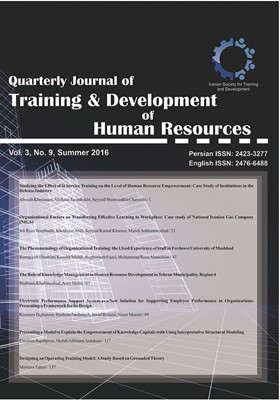تبیین نقش¬هاي مثبت و منفي منتورینگ در بهبود تسهیم دانش: موانع و راهكارهاي پياده¬سازي منتورينگ
الموضوعات :
آرین قلی پور
1
![]() ,
سید جواد موسوی
2
,
محمد هاشمی
3
,
سید جواد موسوی
2
,
محمد هاشمی
3
1 - دانشگاه تهران
2 - دانشگاه تهران
3 - دانشگاه تهران
الکلمات المفتاحية: منتورینگ تسهیم دانش ترک شغل,
ملخص المقالة :
هدف پژوهش حاضر تبیین نقش مثبت و منفي منتورینگ در بهبود تسهیم دانش است. به دلیل رقابت شدید بین شرکت های فعال در صنعت بازار سرمایه، جابهجایی زياد کارکنان مستعد و باتجربه را در این صنعت شاهد هستيم، به همین منظور جهت حفظ و تسهیم دانش در شرکت قبل از ترک پرسنل کلیدی روش منتورینگ پیشنهاد و مورد بررسي قرار گرفت. نمونه آماری این پژوهش کارکنان کلیدی باتجربه و کارشناسان منابع انسانی سه شرکت تأمین سرمایه امین، لوتوس پارسیان و بانک ملت میباشد که با موضوع مورد تحقیق آشنایی دارند. نمونه پژوهش از طريق روش گلوله برفي انتخابشده است. روش تحقیق نيز كيفي و ابزار گردآوری داده ها مصاحبه ميباشد. برای تحلیل داده ها از روش تحلیل مضمون استفاده شده است. به طور كلي هدف پژوهش حاضر رسيدن به پاسخ سه سوال مهم ذيل مي-باشد: 1. موانع تسهیم دانش در سازمان کداماند؟ 2. راه های اجرای داوطلبانه منتورینگ در سازمان کداماند؟ 3. چه راهکارهایی جهت پیشگیری از ترک سازمان توسط کارآموز پیشنهاد میکنید؟ با توجه به نتايج به دست آمده، از دیدگاه افراد مصاحبه شونده موانع تسهیم دانش به سه قسمت موانع فردی، سازمانی و فرهنگی تقسیم میشوند. راهكارهاي اجراي داوطلبانه منتورينگ در سازمان شامل سه بخش آموزش، جبران خدمات و تعیین متصدی اجرای منتورینگ مي-شوند. راهكارهاي پيشگيري از ترك سازمان توسط كارآموز نيز در چهار بخش طبقهبندی شده است كه عبارت است از: استخدام، امتیازات شغلی بعد از منتورینگ، برند سازی و رویه اجرایی منتورینگ.
Allen,T. D., Finkelstein, L. M., & Poteet, M. L. (2009). Designing Workplace Mentoring Programs: An Evidence-Based Approach. Wiley-Blackwell, Singapore.
Bryant, S. E. (2005). The impact of Peer Mentoring on Organizational knowledge creation and sharing an empirical study in a software firm. Group & Organization Management,30(3), 319-338.
Donnelly, R. (2008). The management of consultancy knowledge: an internationally comparative analysis. Journal of Knowledge Management, 12(3), 71-83.
Eby, L. T. (1997). Alternative forms of mentoring in changing organizational environments: A conceptual extension of the mentoring literature. Journal of vocational behavior, 51(1), 125-144.
Egan, T. M., & Song, ZH. (2008). Are facilitated mentoring programs beneficial? A randomized experimental field study. Vocational Behavior, 72, 351–362
Field, J. (2001). Mentoring: a natural act for information professionals? New Library World, 102, 269-273.
Fleig-Palmer, M. M. (2009). The impact of mentoring on retention through knowledge transfer, affective commitment, and trust. Dissertations from the College of Business Administration.
Fleig-Palmer, M. M., & Schoorman, F. D. (2011). Trust as a moderator of the relationship between mentoring and knowledge transfer. Journal of Leadership & Organizational Studies,18(3), 334-343.
Gholipor, R., & Hashemi, M. (2015). The Effect of Mentoring on Succession Planning: Focusing on Individual Development Plan. Research in human resource management,7(2), 25-52.
Gibson, J. L., Ivancevich, J. M., Donnelly, J. H., & Konopaske, R. (2006). Organizations: behavior, structure, processes. New York: McGraw-Hill.
Gillian, B. (2011). Learning to lead in the 'year of the firsts': a study of employer led mentoring for new school leaders in Scotland. (Doctoral dissertation). University of Glasgow.
Hallam, P. R., Chou, P. N., Hite, J. M., & Hite, S. J. (2012). Beginning Teachers Two Contrasting Models for Mentoring as They Affect Retention of Beginning Teachers. NASSP Bulletin,96(3), 243–278.
Hart, E. W. (2009). Seven keys to successful mentoring. Center for Creative Leadership.
Hezlett, S. A. (2005). Protégés' Learning in Mentoring Relationships: A Review of the Literature and an Exploratory Case Study. Advances in Developing Human Resources,7, 505.
Hezlett,S., & K. Gibson, SH. (2005). Mentoring and Human Resource Development: Where We Are and Where We Need to Go. Advances in Developing Human Resources,7(4), 446-469
Karkoulian, S., Halawi, L. A., & Mc Carthy, R. V. (2008). Knowledge management formal and informal mentoring: An empirical investigation in Lebanese banks. The Learning Organization,15(5), 409-420.
Klasen, N., & Clutterbuck, D. (2012). Implementing Mentoring Schemes, a Practical Guide to Successful Programs. Routledge.
Lapointe, É., & Vandenberghe, C. (2017). Supervisory mentoring and employee affective commitment and turnover: The critical role of contextual factors. Journal of Vocational Behavior,98, 98-107.
Lawal, O. A. (2011). An Evaluation of Mentoring In Organizations: Nigerian Peculiarities. IFE PsychologIA : An International Journal, 2011(1), 379-397.
Loebbecke, C., van Fenema, P. C., & Powell, P. (2016). Managing inter-organizational knowledge sharing. The Journal of Strategic Information Systems,25(1), 4-14.
Mathis, R.L., & Jackson, J. H. (2000). Human Resource Management (9th Ed.). South-Western College Publishing.,
Noe, R. A., Hollenbeck, J. R., Gerhart, B., & Wright, P. M. (2007). Fundamentals of Human Resource Management. Fourth Edition. McGraw-Hill/Irwin.
Nonaka, I., & Konno, N. (1998). The concept of" ba": Building a foundation for knowledge creation. California management review,40(3), 40-54.
Pask, R., & Joy, B. (2007). Mentoring-coaching: a guide for education professionals. McGraw-Hill Education (UK).
Ragins, B.R. and Cotton, J.L. (1999). Mentor functions and outcomes: a comparison of men and women in formal and informal mentoring relationships. Journal of Applied Psychology,84, 529-50.
Richard, O. C., Ismail, K. M., Bhuian, Sh. N., & Taylor, E. C. (2009). Mentoring in supervisor–subordinate dyads: Antecedents, consequences, and test of a mediation model of mentorship. Business Research,62, 1110–1118.
Steinar, K. (1996). Interviews: An introduction to qualitative research interviewing. Student litterateur, Lund, 8.
Swap, W., Leonard, D., & Mimi Shields, L. A. (2001). Using mentoring and storytelling to transfer knowledge in the workplace. Journal of management information systems,18(1), 95-114.
Xianting, Y. & Fungfai, N. (2009). Learning Organization and Mentoring Practice: An Empirical Investigation. 17th Annual European Real Estate Society Conference in Milan, Italy.
Zhang, X., & Jiang, J. Y. (2015). With whom shall I share my knowledge? A recipient perspective of knowledge sharing. Journal of Knowledge Management,19(2), 277-295.


